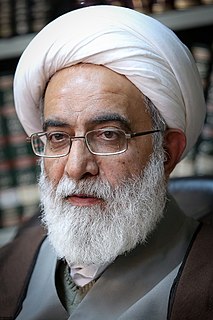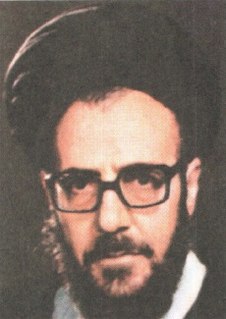Related Research Articles
Ayatollah is an Honorary for high-ranking Twelver Shia clergy in Iran and Iraq that came into widespread usage in the 20th century.
A hawza or ḥawzah ʿilmīyah is a seminary where Shi'a Muslim scholars are educated.

Sayyid Mohammad Kazem Shariatmadari, also spelled Shariat-Madari, was an Iranian Grand Ayatollah. He favoured the traditional Shiite practice of keeping clerics away from governmental positions and was a critic of Supreme Leader Ruhollah Khomeini, denouncing the taking hostage of diplomats at the US embassy in Tehran. In 1982 he was accused of being part of a plot to bomb Khomeini's home and to overthrow the Islamic republic, and he remained under house arrest until his death in 1986. His followers also opposed Ruhollah Khomeini.
Haghani school is a Shi'i school of thought in Iran based in the holy city of Qom and formerly headed by Ayatollah Mohammad Taghi Mesbah Yazdi, an influential theologian. The Haghani Circle has its origin in the Haghani seminary, founded in 1964, which previously had been called Muntashiriya. After Ayatollahs Qoddusi and Beheshti, two of the leading members of the circle, were assassinated in 1981, the hawza changed its name to Shahidan Seminary.

Grand Ayatollah Naser Makarem Shirazi is an Iranian Shia marja' and religious leader.
Shariatmadari may refer to:

Ayatollah Seyed Reza Zanjani was a Shia Iranian cleric who opposed first the autocracy of Shah Mohammad Reza Pahlavi and then theocracy that was established by Ayatollah Ruhollah Khomeini and his supporters following the Islamic Revolution.

Grand Ayatollah Yasubeddin Rastegar Jooybari is an Iranian Twelver Shi'a Marja'.

The Qom Seminary is the largest Islamic seminary (hawza) in Iran, established in 1922 by Grand Ayatollah Abdul-Karim Haeri Yazdi in Qom. It trains Usuli scholars.
Maktab-e Tawhid was a Shi'i seminary for women, established in Qom, Iran's clerical center in 1975, as a wing of the Haghani school.
Sayyida Farideh Mostafavi Khomeini is an Iranian female religious scholar and Ayatollah Khomeini's youngest daughter.
Jami'at al-Zahra is the world's main Shia seminary for women. It is located in Qom, Iran.
Ahmad Khonsari, also Aḥmad Khvānsārī, or Khvunsārī was an Iranian Grand Ayatollah and attained marja status after the death of marja Boroujerdi in 1961. In contrast to the other maraji of his time, who lived in the holy cities of Qom or Najaf, he was based in Tehran, where he ran his own hawza. Khonsari was one of the teachers of Ayatollah Khomeini.
Dar al-Zahra was the first women's Shia seminary to be opened in Qom. It was established by grand ayatollah Mohammad Kazem Shariatmadari, who opened it in 1973 as a section of his hawza Dar al-Tabligh.
Fatemeh Amini is a female religious leader of Iran, who has directed and opened a number of women's seminaries in Qom and Tehran.

Grand Ayatollah Sayyid Mohammad Hadi Milani was an Iraqi-Iranian marja'.
Mohammad Hasan Mamaqani was a leading mujtahid of Najaf in the 19th century.

Seyyed Mohammad Taqi Ghazanfari was a Shia Jurist of the fourteenth century AH. He was born in May 1882 AD in Khansar. He was one of the first people who stood in the contemporary period for Friday Prayers.

Mehdi Shabzendedar Jahromi is an Iranian Shia jurist and member of the Guardian Council."

Seyed Abolfazl Rihani, known as Ayatollah Seyed Abolfazl Mousavi Tabrizi. He was a member of the Assembly of Experts, was involved with the creation of the Constitution of the Islamic Republic of Iran being a member of the Assembly of Experts for Constitution, and was the Prosecutor-General of Iran.